
Photo taken on October 28, 2021 shows the 59th Press Conference on Xinjiang-related Issues in Beijing.
Xu Guixiang: Good morning, dear fellow media reporters. Welcome to the press conference on Xinjiang related issues of Xinjiang Uygur Autonomous Region. I'm Xu Guixiang, a spokesman of the Government of Xinjiang Uygur Autonomous Region.
First of all, I would like to introduce those from Xinjiang who will join us in today's press conference. They are Elijan Anayat, the spokesman of the Government of Xinjiang Uygur Autonomous Region, Buhajar Abla, the Director of the Economic and Social Development Research Center of Xinjiang Agricultural University, Jing Shaohua, the Executive Director of Xinjiang Beidou Tongchuang Information Technology Co., Ltd, Aygul Sidiq, an employee of Xinjiang Hoshine Silicon Industry Co., Ltd., Reyla Qahar, an employee of Xinjiang Kuche Pomegranate Seed Clothing Co., Ltd., Osmanjan Matrozi, the Head of a Labor Dispatch Co., Ltd. in Cele County of Hotan Prefecture in Xinjiang, Nurgul Nur, a migrant worker in Kashgar City of Kashgar Prefecture in Xinjiang, Alimjan Abdureshit, a graduate student of the former education and training center in Atush City of Kizilsu Kirgiz Autonomous Prefecture in Xinjiang, and Turahan Idris, a cotton farmer in Awati County of Aksu Prefecture in Xinjiang.
Next, I would like to share some of our views on relevant issues.
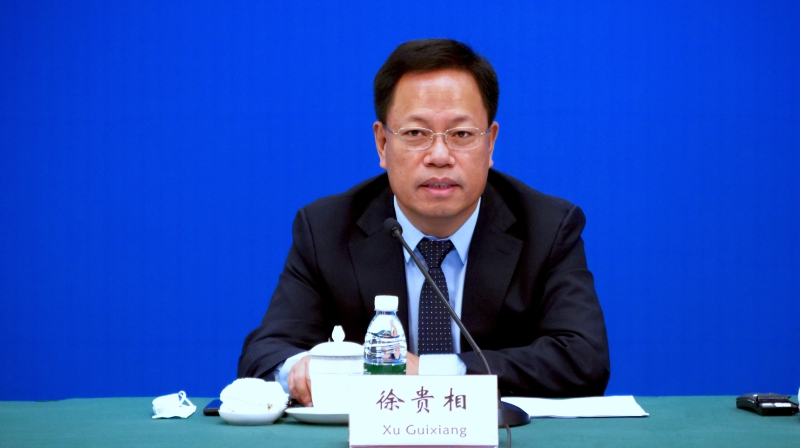
Photo taken on October 28, 2021 shows Xu Guixiang, spokesman of People’s Government of Xinjiang Uygur Autonomous Region speaks at the 59th Press Conference on Xinjiang-related Issues in Beijing.
Recently, the leaders of the United States have issued a fallacy concerning Xinjiang, saying that "there is oppression and forced labor against Uygurs in Xinjiang". We strongly condemn and resolutely oppose such fallacy.
It must be pointed out that Xinjiang affairs are purely China's internal affairs, and the leaders of the United States have no qualification or right to make arbitrary accusations. The so-called Xinjiang related issues are not ethnic, religious and human rights issues at all, they are issues associated with anti-violence, anti-terrorism, anti-infiltration, anti-secession and anti-interference. However, the leaders of the United States have turned a blind eye to this, stubbornly inherited the legacy of the Trump government, and spread fallacies such as "forced labor" and "human rights oppression" in Xinjiang of China. This kind of terrible behavior, which has no bottom line and total madness, will be despised by the people of all ethnic groups in Xinjiang and criticized by the people of insight in the international community. It should be noted that the human rights situation in Xinjiang is several times better than that in the United States. The leaders of the United States should reflect on how to clean up the mess of human rights in their own country, focus their own business, and do less harm to others and not benefit themselves.
So, in today's press conference on Xinjiang related issues, we are about to speak with facts to see who is truly implementing forced labor and who is truly protecting people's labor rights and interests, so as to make the truth known to the world.
Xu Guixiang: It has been a while since the United States, which boasts itself as a "Beacon of Freedom", a "Defender of Human Rights" and a "Paradise of Freedom", has talked nonsense on the labor issue in Xinjiang and won over some countries to impose sanctions on Xinjiang. This is a very absurd hegemonic logic. Next, let me introduce the relevant situation to you.
Xu Guixiang: As we all know, at the very beginning of the 20th century, some capitalist powers in the world pursued colonialism and carried out large-scale and serious forced labor, slavery and exploitation of colonial countries. In this context, the International Labor Organization has promoted its member states to formulate a series of conventions. Among them, Paragraph 1 of Article 2 of The Forced Labor Convention established in 1930 (No. 29) clearly stipulates that "forced labor" refers to "all involuntary labor or services that anyone is forced to engage in under the threat of any punishment." This definition mainly includes three elements: "threat of punishment", "involuntary" and "unlimited object". Then Paragraph 3 of Article 1 of The 2014 Protocol to the 1930 Forced Labor Convention further clarifies that trafficking in persons for the purpose of obtaining labor is also forced labor. It can be seen that judging whether there is "forced labor" should follow the clear definition and strict standards of the international community, and it cannot be determined by the words of some people and the arbitrary imagination of some so-called human rights institutions.
Although the sunshine of the 21st century has been all over the world, yet the legacy of a slave society like forced labor is still deeply rooted in the United States. Not to mention that the United States has a history of trafficking, maltreatment and discrimination against black slaves for hundreds of years, and has committed extremely serious crimes, the United States has witnessed widespread human trafficking, common forced labor in agriculture and private prisons, widespread abuse of child labor, repeated violations of the labor rights and interests of women and the disabled, and continued deterioration of discrimination in employment just in recent few years. There have been numerous appalling and heinous crimes. We believe that the so-called "Beacon of Democracy" of the United States must first illuminate itself. The so-called "Defender of Human Rights" must first protect the human rights of its people. This so-called "Paradise of Freedom" should make its people truly happy.
Xinjiang adheres to the people-centered development concept, formulates a series of active labor and employment policies, and creates conditions for people of all ethnic groups to work with dignity under the sunshine. These are in line with the common values of human society, the reality of economic and social development in Xinjiang, and the good wishes of the people of all ethnic groups in Xinjiang to live a happy life. They are all beyond reproach. With the people of all ethnic groups fully realizing stable, sustainable and long-term employment, their income level, quality of life and spiritual outlook have undergone extensive and profound changes. For example, the annual income in per capita of Xinjiang workers who transfer employment in the mainland is about 40,000 yuan, which is basically equivalent to the disposable income of local urban permanent residents. The annual income in per capita of workers who transfer employment in Xinjiang is about 30,000 yuan, which is much higher than the original income of domestic farmers. Nowadays, people's "money bags" are more and more full. The smile on their faces is more and more brilliant. Their mood is more and more comfortable, and their days are more and more prosperous. The north and south of Tianshan Mountain has formed a gratifying scene that every family has a way to make fortune, everyone has something to do, and every month there could be an income for all of them.
Xu Guixiang: Based on the lies made up by some so-called think tanks and anti-China media, some individual anti-China congressmen in the United States concocted the so-called "Uygur Forced Labor Prevention Act" in a vain attempt to further intervene in Xinjiang affairs and interfere in China's internal affairs. Next, let's invite Buhajar Abla, the Director of the Economic and Social development Research Center of Xinjiang Agricultural University, to share her views.
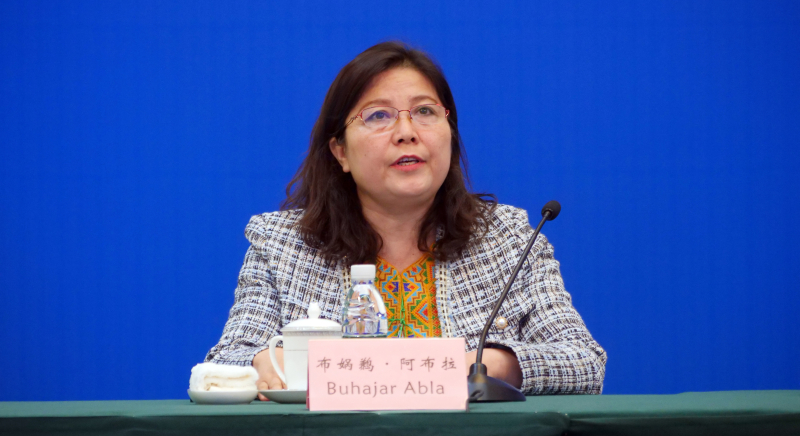
Photo taken on October 28, 2021 shows Buhajar Abla speaks at the 59th Press Conference on Xinjiang-related Issues in Beijing.
Buhajar Abla: The practice of relevant parties in the United States lacks basic factual basis. The fact is that there is no "forced labor" in Xinjiang.
Xinjiang has always followed the Convention of the International Labor Organization and the spirit of its relevant details, and strictly implemented laws and regulations such as the Labor Law of the People's Republic of China, the Opinions of Xinjiang Uygur Autonomous Region on the Implementation of the Labor Law of the People's Republic of China, and the Measures of Xinjiang Uygur Autonomous Region on the Implementation of the Regulations on Labor Security Supervision, so as to bring establishment, operation, supervision, and coordination of the labor relationships into the track of legalization, while further carrying out regular labor law enforcement inspection, and forced labor by means of violence, threat or illegal restriction of personal freedom will be strictly prohibited. It can be seen that the labor and employment of people of all ethnic groups in Xinjiang are protected by law, and all relevant departments and enterprises carry out their work in accordance with the provisions of the law as well.
The people of all ethnic groups in Xinjiang are completely free in labor and employment. Xinjiang adheres to the employment policy of combining workers' independent employment, market-regulated employment, government assistance in employment and encouragement of entrepreneurship, and it also effectively gives play to the role of the market in allocating labor resources, while enabling workers and enterprises of all ethnic groups to build labor relations through independent, voluntary and two-way choice. Workers of all ethnic groups in Xinjiang have the freedom to choose their careers. They can go to any place and do any work out of their own will, and their personal freedom has never been restricted. What the government does is to create a good labor and employment environment, create conditions for the people of all ethnic groups to find satisfactory jobs and obtain stable income, and ensure the labor and employment rights of the people of all ethnic groups to the greatest extent.
The labor rights and interests of the people of all ethnic groups in Xinjiang are protected according to law. Based on the principle of equality, voluntariness and consensus through consultation, workers of all ethnic groups sign labor contracts with enterprises according to law, and their rights to labor remuneration, rest and vacation, labor safety and health protection, social insurance and welfare are protected according to law as well. Besides, the rights and interests of workers of all ethnic groups, whether in Xinjiang or other regions, in religious belief, national culture, language and writing, are also respected and protected according to law. There is no doubt that the people of all ethnic groups in Xinjiang are working with dignity under the sunshine and creating their own happy life. There is no so-called issue of "forced labor"at all.
Xu Guixiang: In recent years, the U.S. Department of Commerce and other departments have abused long-arm jurisdiction and export control measures on the grounds of so-called "forced labor" and "violation of human rights", in an attempt to suppress enterprises in Xinjiang, create "forced unemployment" and "forced poverty" through sanctions, so as to put the people of all ethnic groups in Xinjiang in poverty, isolation and backwardness, so as to achieve the sinister purpose of bringing disaster to Xinjiang. Next, let's invite the staff of relevant enterprises subject to sanctions to share their views.
First of all, let's invite Mr. Jing Shaohua, the Executive Director of Xinjiang Beidou Tongchuang Information Technology Co., Ltd., to introduce the relevant situation.

Photo taken on October 28, 2021 shows Jing Shaohua speaks at the 59th Press Conference on Xinjiang-related Issues in Beijing.
Jing Shaohua: On July 9th, 2021, the U.S. Department of Commerce listed six science and technology informatization enterprises in Xinjiang, including Xinjiang Beidou Tongchuang Information Technology Co., Ltd., on the grounds of so-called "human rights violations and high-tech monitoring", and it has also imposed unreasonable sanctions. Considering this, we’re hereby expressing our strong indignation and firm opposition to the lies and fallacies and despicable actions like evil robbers!
Xinjiang Beidou Tongchuang Information Technology Co., Ltd. is a private enterprise established in 2014, mainly engaged in the construction of system integration projects and after-sales operation and maintenance services in the information field. All production and business activities of our company are legal and compliant, from 12 employees at the beginning of its establishment to nearly 300 employees today, with an annual output value of millions of yuan to hundreds of millions of yuan. We have always won the recognition of customers and the market with excellent technology and high-quality service. At present, we have grown into the only private enterprise with national class-A qualification in Xinjiang, which has made its due contributions to serving the information construction of Xinjiang, to improving the level of social governance and building a harmonious society of living and working in peace and contentment.
Internationally, the United States has been leading in investment, R & D and application of big data and information platforms. So, I would like to ask whether the investment of the United States in this regard is to enhance the sense of security of the American people. If so, what is the problem with China's approach of the same kind? What is wrong with the same approach taken in Xinjiang? What is the purpose of the United States' groundless accusations against China and Xinjiang? The stigmatization and suppression of the development of scientific and technological informatization in Xinjiang by the United States is a totally "double standard". Facts have proven that the United States does not care about the facts and truth at all, nor about human rights in Xinjiang as well, but it only politicizes the normal economic order, interferes with the normal industrial chain, and hinders the development of enterprises and informatization industry in Xinjiang. Its real plot is to disrupt Xinjiang and curb China's development.
The U.S. Department of Commerce has listed our company in the "entity list", which has seriously damaged the interests of our company and all employees. We will resolutely defend our legitimate rights and interests according to law, and unswervingly fight with American and Western Anti China forces to the end in order to better serve the society and the construction of beautiful Xinjiang!
Next, let’s take a look at some photos of our company.
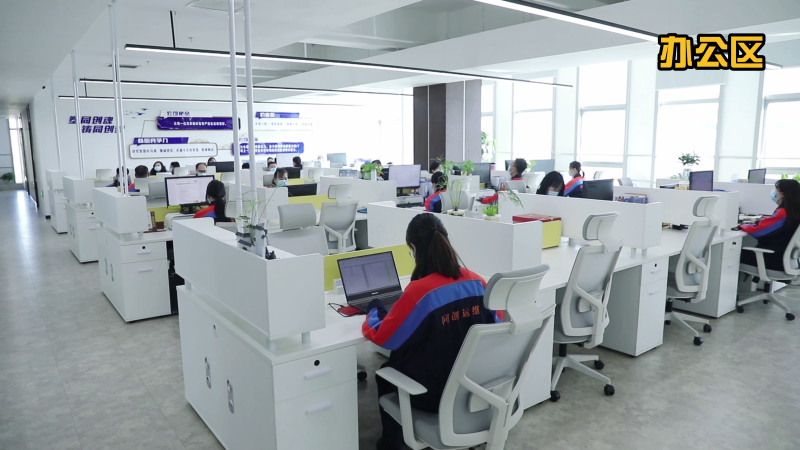
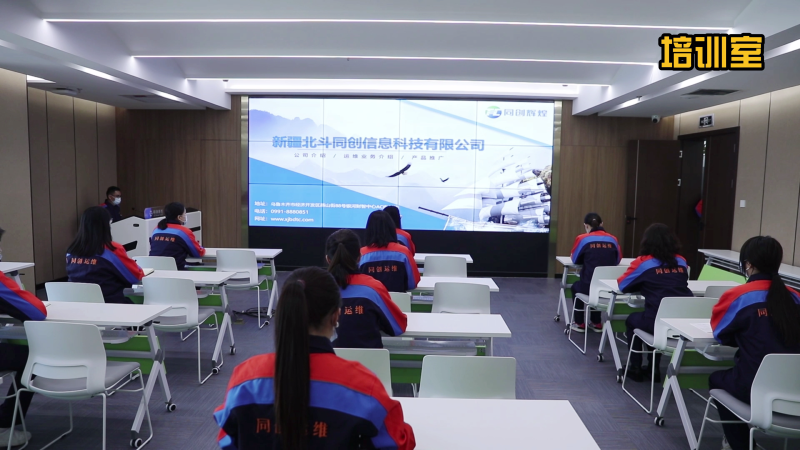

Xu Guixiang: next, let's invite Reyla Qahar, an employee of Xinjiang Kuche Pomegranate Seed Clothing Co., Ltd., to introduce the relevant situation.
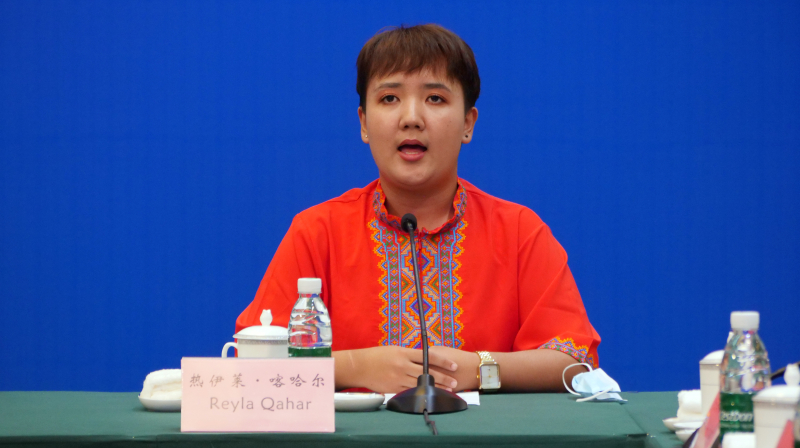
Photo taken on October 28, 2021 shows Reyla Qahar speaks at the 59th Press Conference on Xinjiang-related Issues in Beijing.
Reyla Qahar: My name is Reyla Qahar. Now I work in the human resources department of Kuche Pomegranate Seed Clothing Co., Ltd.
Based on the distorted reports of some media, the United States sanctioned the cotton industry in Xinjiang under the pretext of "forced labor", which had an adverse impact on our company. Here, I would like to say that they talk about "human rights" and "care about the living conditions of ethnic minorities in Xinjiang", but as a matter of fact, they are violating our human rights and undermining our happy life. We can see their hypocritical faces and the trick of pretending to be benevolent.
At the beginning of this year, the government issued many preferential policies which gave us strong support. For example, they provide internship subsidies, pre-job training subsidies, freight subsidies, electricity subsidies, food subsidies, and etc. to our company, and they also often hold investment promotion meetings to help the company expand its business. Now, our company's orders have begun to increase, the benefits have improved, and our life is gradually returning to the previous state. We believe that rumors have no vitality. They will only make those rumor mongers ugly and make people see their faces more and more clearly. Their conspiracy will never succeed.
Now let’s watch a video of our company.
Xu Guixiang: Next, let's invite Aygul Sidiq, an employee of Xinjiang Hoshine Silicon Industry Co., Ltd., to introduce the relevant information.
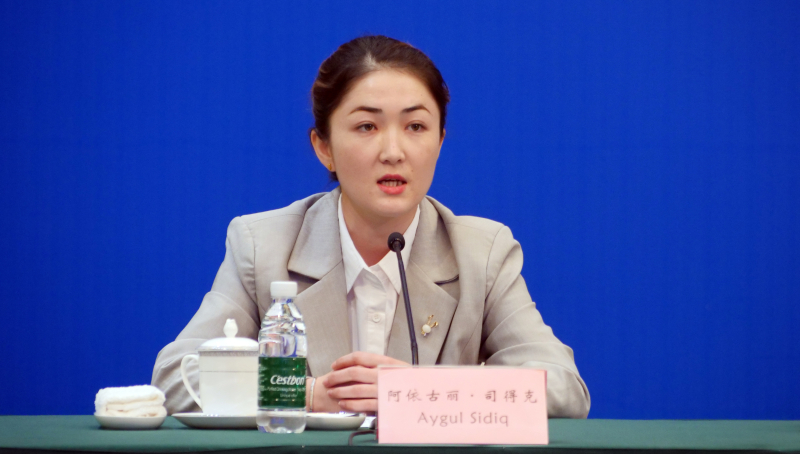
Photo taken on October 28, 2021 shows Aygul Sidiq speaks at the 59th Press Conference on Xinjiang-related Issues in Beijing.
Aygul Sidiq: I am an analyst of the organic silicon quality inspection center of Xinjiang Hoshine Silicon Industry Co., Ltd. After graduating from University, I saw the recruitment information of Hoshine silicon industry on the Internet. I heard that this is a large company, and I was looking forward to it while feeling worried. I tried to contact the human resources department of the company, and quite surprisingly I actually got an interview and luckily passed the interview and became a regular employee here. I'm very satisfied with this job, and now I’m working vigorously.
Recently, I heard that our company was sanctioned by the United States, saying that our company has "forced labor". I have heard a lot about the word "forced labor" recently, and our cotton and cotton products in Xinjiang have been stigmatized as products of "forced labor" and they were boycotted by some foreign clothing brands. I feel very angry about this. Where does "forced labor" come from? Now it's nonsense to say that our company also has "forced labor"!
In fact, instead of forcing us to work, our company respects us very much and creates a fair and just environment, as well as good working and living conditions for us. The company has signed a labor contract with me. In addition to various insurances, I can get a salary of 5,000-6,000 yuan per month, a food subsidy of 360 yuan per month and some other benefits as well. Besides, the holidays would just be free for any employee to take a break, and the company has arranged a free dormitory for us. The dormitory has an independent bathroom, kitchen, TV, air conditioning, heating, etc. The company does not discriminate against employees of all ethnic groups at all, nor will it restrict our freedom. The leaders of the company also take good care of us. We are very comfortable working here. My parents are also very satisfied with my work. Many ethnic friends around me envy and desire to work in our company.
We are busy with our work, but the US government sanctions our company under the guise of so-called human rights. Isn't that "forcing" us to lose our jobs and "forcing" us to be poor? We will never be fooled. Don't even think of this!
Now let’s watch a video reflecting the situation of our company.
Xu Guixiang: Some anti-China forces in the United States have wantonly attacked the policy of transferring urban and rural surplus labor force to employment in Xinjiang, falsely claiming that Xinjiang forces ethnic minorities to work. On this issue, let’s invite Osmanjan Matrozi, the Head of a Labor Dispatch Co., Ltd. of Cele County in Hotan Prefecture, to talk about his views.
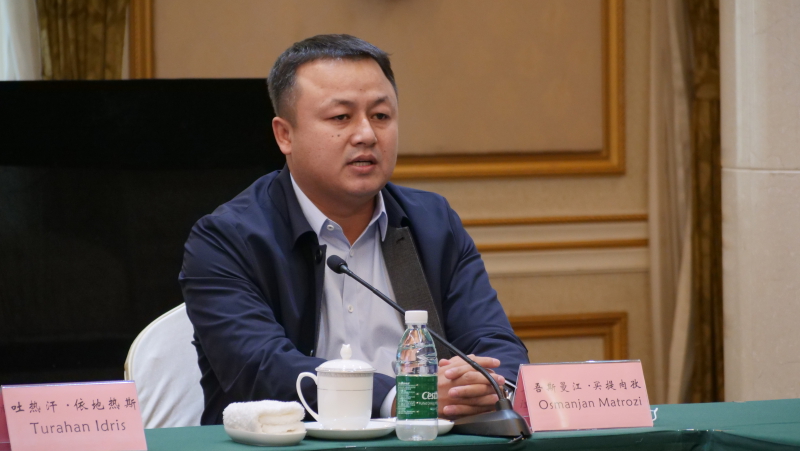
Photo taken on October 28, 2021 shows Osmanjan Matrozi speaks at the 59th Press Conference on Xinjiang-related Issues in Beijing.
Osmanjan Matrozi: My name is Osmanjan Matrozi. I am the Head of a Labor Dispatch Co., Ltd. of Cele County in Hotan Prefecture.
Our company was founded in 2018. It is mainly engaged in finding suitable jobs for those who need to work and help them sign employment contracts, supervise the legal implementation of contract terms, protect the rights and interests of migrant workers, identify and solve the difficulties during work at any time, and pay wages on time.
The migrant workers dispatched by our company are mainly the surplus labor force from various towns and villages (communities) in Cele County. They all sign up voluntarily and there is no "forced labor" at all. Job seekers generally apply for jobs through the village (community) or our company. After the company's registration and review, we will contact qualified employers for them. Our company will talk to every migrant worker to understand their expertise, interests and future employment plans. After fully understanding all of them, we will help them choose their jobs according to their wishes. Through negotiation, both parties would finally reach a labor dispatch agreement. At the same time, before they leave, we will carry out training on safety production, diet and daily activities to ensure that they can work smoothly and safely.
At present, the labor dispatch workers of our company have reached the wage standard of minimum monthly income of 3,000 yuan for general types of work, 4,500 yuan for technical types of work and 5,500 yuan for professional and technical types of work. By signing labor contracts one by one, we can protect the labor rights and interests of employees and realize stable employment. In order to further improve the follow-up service of migrant workers, solve the worries of migrant workers, and let migrant workers better devote themselves to production and labor. In the future, our company will further improve its service capacity and level, encourage more surplus labor force to go out for employment, strive for the most direct and maximum benefits for them and help them live a happy life.
Xu Guixiang: Some anti-China forces in the US slander the existence of “forced labor” in Xinjiang education and training centers, in which students are “forced” to work after finishing their studies and continue to suffer from “forced labor”. Next, let’s give the floor to Alimjan Abdureshit, a trainee who has finished his studies at an original education and training center in Atush City, Kizilsu Kirghiz Autonomous Prefecture, Xinjiang, to introduce the relevant situation.
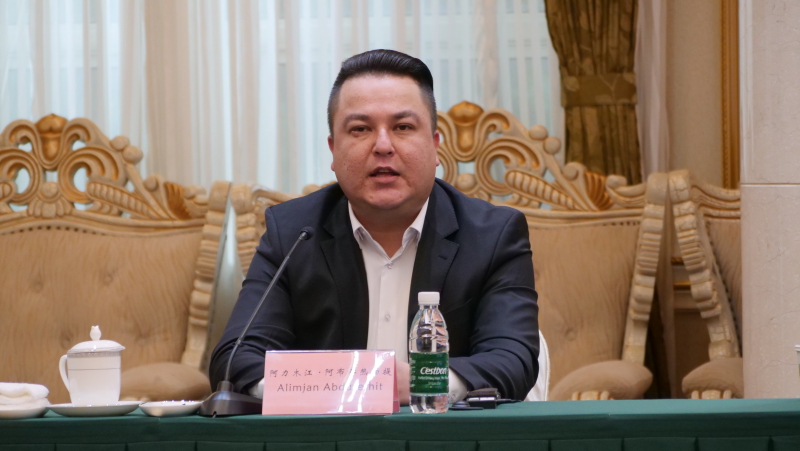
Photo taken on October 28, 2021 shows Alimjan Abdureshit speaks at the 59th Press Conference on Xinjiang-related Issues in Beijing.
Alimjan Abdureshit: I am Alimjan Abdureshit, a trainee from Atush City, Xinjiang, who has finished the studies at an education and training center. Now I am a trainer in an insurance company.
In the education and training center, we could choose one or two vocational skills according to our hobbies. I chose electronic technology, and my classmates also chose their favorite vocational skills. Some of them chose vehicle maintenance, some cooking, and some cosmetology and hairdressing. Whatever professional skills we chose, we all needed to take theoretical courses first and then started to operate practically. Our practical operation is only to exercise skills, not to produce goods. There is no such thing as “forced labor” as the anti-China forces in the US call it.
After finishing relevant courses, I applied for a job in Kizilsu Kirghiz Autonomous Prefecture Branch of China Life Insurance Company Limited through recruitment information, mainly responsible for training of personnel. I like my present job very much. I often deal with the different people, which not only widens my knowledge and improves my ability of communication, but also provides me with a good salary every month. Now I have my own family with two children, and my five-year old daughter has been in kindergarten. We are having a happy life.
Xu Guijiang: Xinjiang cotton is white, but some people’s heart is black. Especially recently, a number of clothing brands issued a statement banning Xinjiang cotton, which seriously damaged the reputation of Xinjiang cotton textile industry and caused a bad impact. Next, let’s give the floor to Turahan Idris, a cotton grower from Awati County, Aksu Prefecture, to introduce the relevant situation.
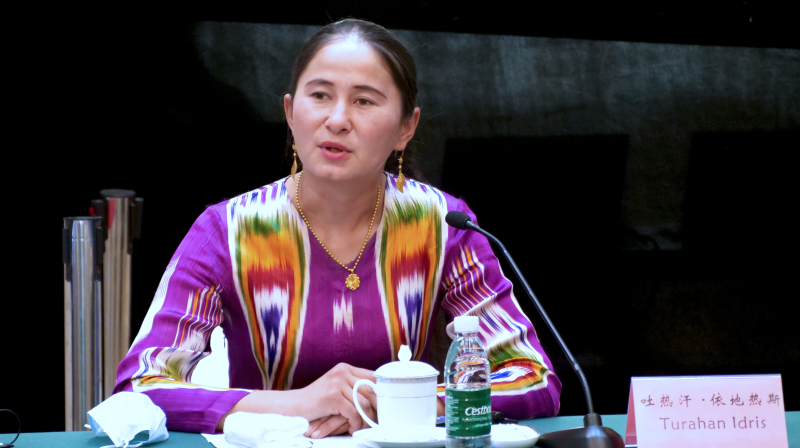
Photo taken on October 28, 2021 shows Turahan Idris speaks at the 59th Press Conference on Xinjiang-related Issues in Beijing.
Turahan Idris: I am Turahan Idris, a cotton grower from Awati County, Aksu Prefecture. My family grew 200 mu of cotton, with an annual income of about 200,000 yuan.
In the past, growing cotton basically depended on human labor, which cost a lot of time and money. Before growing cotton, human labors were needed to recycle cotton straw and the abandoned film from the previous year. While growing cotton, what was used was the old tractor, which was very slow, and required a special person to drive it. To the time to harvest cotton, some persons were needed to pick the cotton specially, and we must be responsible for their room and board, which cost a lot. My family usually hired the some migrant workers, who came to Xinjiang from Henan and Sichuan, and local villagers to help us, and paid them according to the market price. They could earn at least more than 5,000 yuan a month.
As the cotton leading grower in our village, in recent years, my family has signed the contract of agricultural machinery service with the cooperative of agricultural machinery service and used mechanization to grow. Whether we needed to plow, sow or pick, large-scale mechanical equipment could be operated to the fields with just a phone call. During the growing period this year, more than 200 mu of cotton was finished in just two days with a large-scale cotton planter. In addition, fertilization was also finished by drones, and it only took 3 hours to finish the fertilization of all cotton. Spraying per mu of cotton cost only a few yuan, which not only saved human labors, but also realized the non-contact fertilization, greatly reducing the damage to cotton seedlings. To the time to pick cotton, I would ask the cooperative to drive cotton pickers to help, and it only took several days to finish picking. Also, the charge was not high. Compared with before, we could save tens of thousands yuan just in cotton picking.
Now, my husband and I not only grow cotton, but also develop an orchard, open a supermarket and do breeding. We have more and more money and are living a good life. Some people outside China say that " farmers in Xinjiang are forced to grow and pick cotton." This is talking nonsense. They just don't want us to live a good life, want our farmers' cotton to rot in the fields, and hope that we have no work and no money. The heart of these people are too black, and we will never to be fooled.
Next, let’s watch a video of mechanical cotton picking.
Xu Guixiang: For some time, some international anti-China forces have ignored the great efforts made by Xinjiang to protect human rights, and stigmatized policies and measures, to promote the employment of ethnic minorities in southern Xinjiang and get rid of poverty and become better off, as "forced labor". Today, we have invited Nurgul Nur, who comes from Kashgar City, Kashgar Prefecture, to introduce the relevant situation.
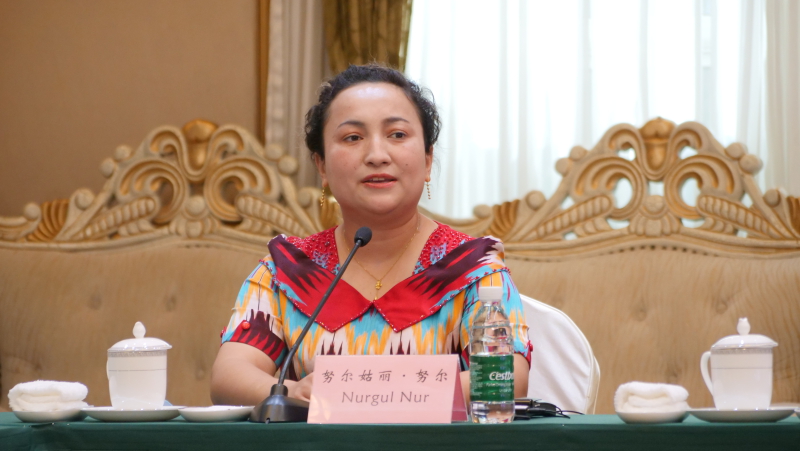
Photo taken on October 28, 2021 shows Nurgul Nur speaks at the 59th Press Conference on Xinjiang-related Issues in Beijing.
Nurgul Nur: I am Nurgul Nur, coming from Boshkram Town, Kashgar City, Xinjiang, and there are 6 people in my family. A few years ago, my father had been hospitalized for prolapse of lumbar intervertebral disc, which put my family in a difficult situation, and my mom was the one to shoulder the burden. In recent years, the government has formulated and implemented many good policies, which helped us get rid of poverty and become rich.
One example is the policy of supporting for the development of courtyard economy. It helped my family to trim and plan the idle 1.5-mu courtyard. Part of it was used to grow courtyard vegetables, which helped us save more than 2,000 yuan on vegetables every year. The other part of it was used to develop forestry and fruit industry. The government arranged for professional technicians to guide us and taught us how to grow, and gave out free fertilizer. This year, the grapes, red dates and pomegranates grown by my family were harvested, and our village cadres found a market for us. In the past, there were 5 sheep in my family, and according to the poverty alleviation policy, our village also gave me 10 sheep. Now our breeding technology has been improved a lot, and there are more sheep in the sheep pen. There are 35 sheep in my family now.
One example is the policy of government-subsidized house. In 2015, we enjoyed the government subsidized housing subsidy of 28500 yuan, and plus the part we paid, we built a new house. The house was spacious and bright. The tap water pipe was connected to the kitchen, and the toilet was transformed into a water flushing toilet. We could watch TV and use refrigerator, electric water heater, etc. It is particularly comfortable to live.
Another example is the policy of finding jobs locally. The government has developed a number of rural cooperatives and built a number of factories in our village, which made it convenient for us to find jobs in our own backyard. After graduation, I applied to work in the agricultural machinery cooperative in our village with a monthly salary of 3000 yuan. Now my family's average income has been more than 10,000 yuan, reaching a well-off level. We are very satisfied.
Xu Guixiang: Next, let's give the floor to the reporters to exchange views on their concerns. First of all, let's invite the reporters from Xinhua News Agency to ask questions.
Xinhua News Agency: Spokesperson, you’ve said many times that the US plays “Xinjiang card” and intends to disrupt Xinjiang and contain China. Then why does US do such thing? What are the deep causes behind it? How do you think Xinjiang-related policy in the US?
Xu Guixiang: In recent years, as the China's comprehensive national strength continues to improve, the system in China becomes more and more attractive, the governance in China becomes more stable, and China’s status becomes more prominent, which has caused panic in the US, and many people in American politics believe that China is a threat to the US. On March 3, 2021, the White House National Security Council issued the Interim National Security Strategic Guidance, saying that "China is the only potential competitor capable of combining its economic, diplomatic, military and technical forces to pose a lasting challenge.” Bannon, the chief strategist of the Trump administration, once clamored to "return China to the third world"; furthermore, the Biden administration clearly identified China as the "most severe competitor", which is essentially to curb China's rise.
Why has Xinjiang become the focus of this “most serious competition”? I think there are four main reasons. Firstly, the strategic position of Xinjiang is special and is geographically located in the center of Asia. It’s an important security barrier of western China. View from the US, disrupting Xinjiang can contain China and eliminate the “threat” to the America’s position as “worldwide hegemon”. As Wilkerson, the chief of staff of former secretary of state Powell, openly admitted that the best way for the CIA to destabilize China was to make unrest in China and used Uygurs to keep provoking Beijing, so it could bring China down from within without external forces. Secondly, Xinjiang-related issues concern historical, ethnic, cultural, religious, international and other factors. They involve a wide range of areas, are closely related, and attract high attention. If anything happens, a lot things will be involved. Under the current pattern of international public opinion, anti-China forces in the US and West manipulate international public opinion. They just need to create a little fake news and get the propaganda machine running, and it will make a splash. So to them, this is the best “cheap card” to use. Thirdly, the US is trying to divert its domestic contradictions by playing “Xinjiang card”. In the current US, the unbalance and inequality of economic and social development is intensifying, and the struggle between racism and anti-racism is fierce. In addition, the hypocrisy of American universal values is prominent, and the whole society is in a state of tearing. But when it comes to disrupting Xinjiang and suppressing China, they are highly united. By doing so, they can not only gain internal “consensus”, but also score “political points”. They can also divert domestic people’s attention and reduce internal pressure, which can be said to achieve multiple purposes. Fourthly, the US used Xinjiang-related issues to ask its allies, including Five Eyes allies and the EU, to take sides and draw a clear line with China, which has not only strengthened its alliance system and established itself as a “hegemon”, but also further isolated and suppressed China in the international community.
In the history of the world, the rise and fall of major powers, with regularity to conform to, are caused by various factors. The rise of one country does not necessarily lead to the fall of others. The logic that the US hopes to maintain its strength by disrupting Xinjiang and containing China is extremely absurd and impossible to realize.
Xu Guixiang: Next, reporter from the China News Agency, please raise your question.
China News Agency: Some countries have published a large number of books related Xinjiang in recent years, and the books contain much distortions and slanders on education and training and human rights in Xinjiang. What is Xinjiang's response to this?
Xu Guixiang: We will invite Elijan Anayat to answer this question for us.
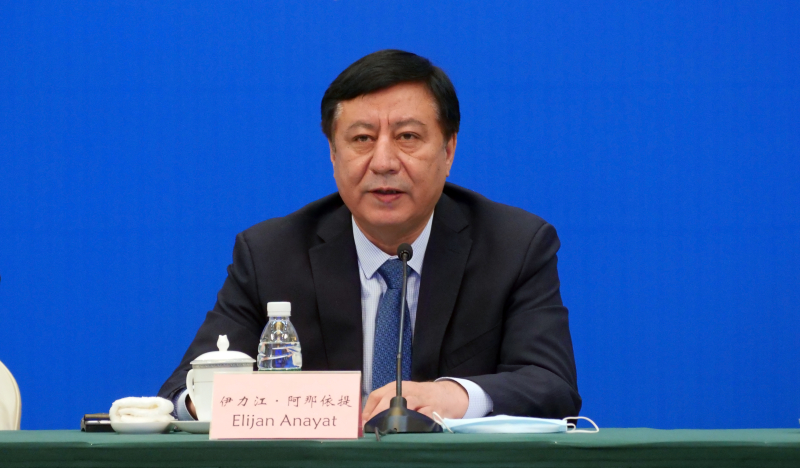
Photo taken on October 28, 2021 shows Elijan Anayat, spokesman of People’s Government of Xinjiang Uygur Autonomous Region answers questions at the 59th Press Conference on Xinjiang-related Issues in Beijing.
Elijan Anayat: It is true that the anti-China forces have been trying to slander Xinjiang and disrupt the development of Xinjiang in recent years. And to do this, they have tried unscrupulous means to launch a public opinion attack against Xinjiang on the excuse of "culture". So they concocted a number of confusing Xinjiang-related books with a new style of expressions, which have brought the worst effects on the international community.
However, these books are completely rubbish made up of illusion. Judged from the content, we see that the books are nothing but a large number of shocking false stories and lies that are beyond ordinary people's imagination; And as for their tricks, the anti-China forces just gathered a group of "actors" with violations of laws and crimes, moral corruption and bad deeds. These men were then made as so-called "parties", "victims" and "key witnesses", who fabricated so-called "experience in educational and training center", "painful experience" and "ubiquitous surveillance", in a vain attempt to confuse the false with the truth; Logically, the books always engage in "presumption of guilt" against Xinjiang through preconceived methods, and even deliberately change concepts to confuse the public.
These books were in fact controlled by a group of special "Directors". Among them, there are so-called "scholars", so-called "think tanks", so-called "non-governmental organizations" and news organizations. Although they are from different industries, they are all engaged in despicable activities with anti-China purposes. For example, the notorious Adrian Zenz, Sean Roberts, the Australian Strategic Policy Institute, the National Democracy Foundation, the BBC and so on. These people and institutions are nominally "producers". In fact, on the excuse of "human rights" and "culture", they are acting as the "vanguard" of the US and western anti-China forces to attack Xinjiang.
Books are supposed to be the treasure house of the spiritual culture of human society, they are supposed to be the recorder of the changes in people's production and life in different periods. However, the anti-China forces in the United States and the west use books to engage in political manipulation so as to wantonly attack and slander Xinjiang regardless of cost and consequences. This is a blasphemy against books and a great provocation to the people of all ethnic groups in Xinjiang. And the books written by them are just worthless.
Xu Guixiang: Next, reporter from the Information Telegraphic Agency of Russia-TASS, please raise your question.
Information Telegraphic Agency of Russia-TASS: Some media reported that the Chinese government had ordered to change the appearance of some mosques. What's your comment on this?
Xu Guixiang: Mr Elijan Anayat will answer the questions for us.
Elijan Anayat: Xinjiang attaches great importance to the protection and repair of mosques, helping and supporting mosques to continuously improve conditions and ensure the normal religious needs of religious believers. According to China's religious policy, religions adhere to the principle of independence and self-management. So the appearance of mosques is determined by the religious community itself. What is more, the appearance is also the result of long-term historical evolution. Government departments will never intervene. At present, there is a great diversity in the styles of mosques in Xinjiang. Suppose the government had forcibly unified the mosques, there will be no such a diverse appearance of the mosques.
Xu Guixiang: Next, reporter from Macau Asia Satellite Television, please raise your question.
Macau Asia Satellite Television: The Israeli media published an article entitled Who Mentioned the Destruction of Uygur?, trying to hype the "hearing" held by the so-called "Uygur Tribunal". And Chinese Embassy in Israel refuted this article. Then we saw Israeli media reported that local officials said that considering its relations with China, Israel refused to sign a French-led joint statement on Xinjiang last week. What is Xinjiang's response to these acts? Thank you.
Xu Guixiang: The so-called “Xinjiang-related issue” is not about ethnics, religions or human rights, but it is about anti-terrorism, anti-infiltration, anti-secession and anti-interference. Foreign anti-China forces, including the "Uygur Tribunal", are extremely vicious with all sorts of ugly behaviors, and have long become a joke in the international community. But we are pleased to see that more and more countries and people of insight in the world that come forward and spoke out. They supported Xinjiang and refuted fallacies, which has won the respect of the people of all ethnic groups in Xinjiang. We hope that the international community can further understand the real situation in Xinjiang and further understand the evil intentions of the United States and other western anti-China forces, so we can jointly resist the use of the so-called human rights issue for political manipulation and hegemonism, and let the light of justice drive away the haze of evil.
Xu Guixiang: Next, reporter from Macao News Agency, please raise your question.
Macao News Agency: It is reported that two large electrical supermarkets in the United States have taken off the shelves two camera products of Dahua Technology and HikVision, saying that their use in mosques and religious places of Muslim in Xinjiang has violated the human rights of Uygurs and Kazaks. What is the spokesman's comment on this? thank you!
Xu Guixiang: Mr Elijan Anayat will answer the questions for us.
Elijan Anayat: It is a common practice of the international community to use modern scientific and technological products to improve social governance. Xinjiang has installed camera in urban and rural public areas, main roads, transportation hubs and other public places according to law, in order to improve social governance and effectively prevent and combat crime. And these practices have enhanced the sense of social security and won the general support of the people of all ethnic groups.
Same camera products in mosques and other religious places are aimed to protect the safety of religious people and believers, and to prevent and combat violent terrorists’ criminal activities. I believe all of you have also seen reports that in 2014, Juma Tayir, vice president of Xinjiang Islamic Association and the Mawla of Id Kah Mosque in Kashgar, was brutally murdered by terrorists after presiding over the Fajr. The documentary Fighting Terrorism in Xinjiang produced by China Global Television Network (CGTN) uncovered the scene of the tragedy. If there is no evidence recorded by the camera, it would be more difficult for solving the case, no mention exposing the brutal acts of violent terrorists to the world! However, some people have falsely alleged that the installation of camera products in mosques in Xinjiang is to monitor mosques and punish Muslims, what a nonsense!
Xu Guixiang: I would like to say a few more words about this question. Judging from the violent terrorist activities in some countries in the world in recent years, mosques are often important targets for terrorist attacks. Therefore, installing cameras in mosques is, first of all, the need of counter-terrorism. The purpose of doing so is to provide religious believers with safe places for normal religious activities and to protect the safety of mosques and religious believers. From the perspective of social governance, mosques is a part of the society. So it is also necessary to strengthen scientific and effective management of it. As far as I know, Xinjiang is not the only place that has installed cameras in mosques. I also see that cameras are installed in mosques in many places around the world. And I don't think that is for the so-called needs of monitoring religious believers. This view of the United States and the west is very far-fetched and does not align with the actual situation.
Xu Guixiang: Next, reporter from the China Central Television, please raise your question.
China Central Television: In the past two years, we have seen that the anti-China groups from the United States and west have submitted bills to the government with the help of false public information, and fixed the anti-China policies by law. What legal measure will China, especially the Xinjiang Uygur Autonomous Region will take? And will the enterprises and individuals subject to sanctions and violations continue to take legal measures to deal with the false information, including some media?
Xu Guixiang: In order to carry out political manipulation to attack Xinjiang, the anti-China forces in the United States and the west have indeed taken many measures. And all these measures are unscrupulous, including the use of the so-called legal methods. For example, when it comes to labor, there are strict standards in the international community to judge whether there is forced labor, and the definition of forced labor is crystal clear. It is difficult for the United States to find the evidence it wants in the international community, and relevant international laws and conventions do not support its practice, either. So if the US wants to achieve its intentions, it would have to adopt domestic laws and stretch their arms to interfere in the internal affairs of other countries, which leads to the "long-arm jurisdiction". Using one country's own domestic laws to interfere with other countries and regions’ internal affairs is obviously hegemonism and bullying. I think this practice of the United States and the west is illegal in nature, so we stand strongly against of it.
As for Xinjiang-related issues, we will also resolutely take up legal weapons to fight for our nation. On the one hand, we will make full use of the principles and spirit of relevant international laws and conventions formulated by the United Nations and international organizations, and use these as weapons to fight against the anti-China forces. On the other hand, we are determined to safeguard our rights and interests with China’s domestic laws. You can also see that the Standing Committee of the National People's Congress has passed the Law Against Foreign Sanctions, which provides an important legal weapon for us to carry out fights against unreasonable sanctions against from the United States and the west. Xinjiang will continue to abide by the principles and spirit of the relevant statutes and conventions of the United Nations and international organizations, follow China's constitution and legal provisions, actively promote local legislation, raise the effective successful experience in practical work to the legal level, ensure that all work is carried out on the track of the rule of law, and better provide legal protection for the human rights of the people of all ethnic groups.
Xu Guixiang: Thank you, friends from media as well as all the speakers. Since the time is limited, that’s all for today’s press conference. Thank you !








